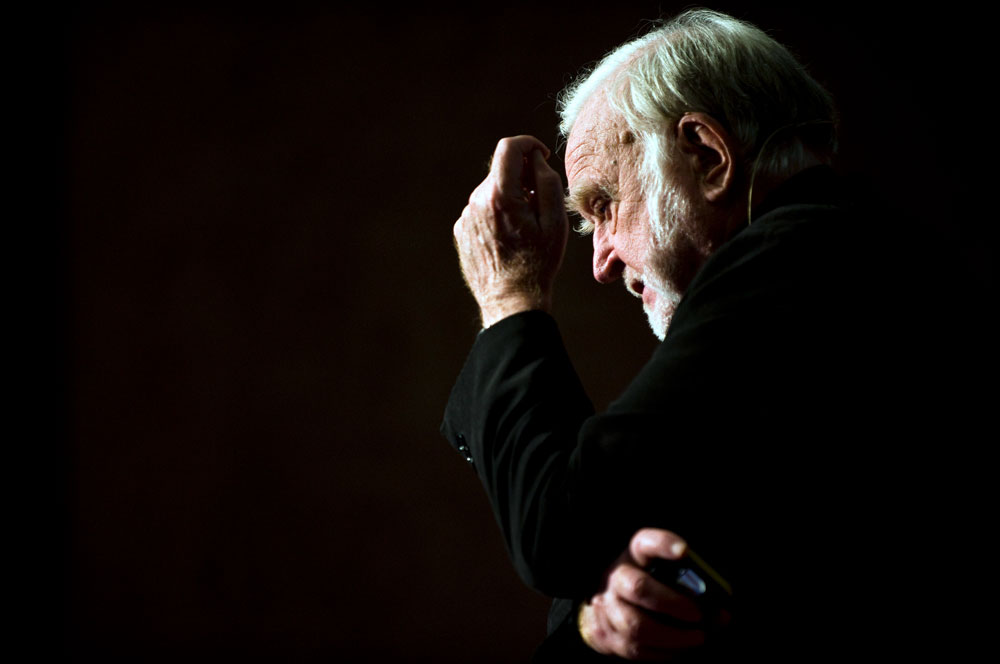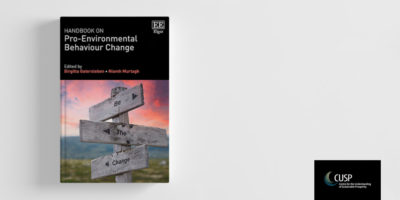A visionary for our time
Professor Mihaly ‘Mike’ Csikszentmihalyi was one of the founders of the positive psychology movement and father of the concept of ‘flow’. His death last month at the age of 87 marks the passing of a rare and visionary scientist. In this blog, Amy Isham and Tim Jackson reflect upon his life and legacy.
By AMY ISHAM and TIM JACKSON

Mihaly (‘Mike’) Csikszentmihalyi was born on 29th September 1934, in what was then the Italian port of Fiume and is now a city in Croatia known as Rijeka. He was the son of a Hungarian diplomat Alfred Csikszentmihalyi and his wife Edith Jankovich de Jeszenicze.
Growing up during the second world war, he experienced trauma at an early age. One of his brothers was killed in the Siege of Budapest; the other died in a labour camp in Siberia. His father was threatened with a death sentence in his native Hungary, and the family was forced into exile when he was only 14. The young Mihalyi left school to help support the family income. He himself spent time in an Italian prison camp, where he played chess to occupy his mind and escape the boredom of captivity. He later noted that chess was ‘a miraculous way of entering into a different world where all those things didn’t matter’.
Csikszentmihalyi’s interest in psychology was triggered accidentally when—travelling through Switzerland as a young man with little money to spare—he decided to attend a free lecture about UFOs. It turned out to be a talk by the psychologist Carl Jung describing how trauma could lead war veterans to manifest their inner anxiety as UFO sightings in the sky. Inspired by this science of human nature, he moved to the US to study it. Working nights to fund his degree, he graduated from the University of Chicago in 1960 and five years later completed a PhD there as well. It was during his doctoral degree that he became fascinated by the creative states of mind reported by artists. The study of creativity led him to explore these extraordinary states of ‘optimal experience’ further.
Mike’s early immersion in chess at a prison camp had convinced him that the content of our inner lives is as important in determining our happiness as the outer circumstances. By losing himself in chess, he was able to create an inner life that was not just tolerable but positively enjoyable. ‘People who learn to control inner experience will be able to determine the quality of their lives,’ he once said. And that’s ‘as close as any of us can come to being happy’.
In the following years, he spoke to artists, rock climbers, basketball players, hockey players, dancers, composers, musicians and chess grand masters. All of them used very similar language to describe their experience. ‘You are in an ecstatic state to the point where you feel as though you almost don’t exist,’ said one of the musicians he interviewed. ‘I have nothing to do with what is happening. I just sit there watching it in a state of awe and wonderment. And the music just flows out of itself.’
Csikszentmihalyi coined the term ‘flow’ to capture this phenomenon. It may seem paradoxical to propose that happiness can be achieved by losing one’s sense of self. But numerous subsequent studies (including our own) have confirmed that those more prone to experience flow also report higher levels of subjective wellbeing.
Not content with simply describing the phenomenon, Csikszentmihalyi strove to understand both the characteristics and the determinants of optimal experience. He identified a set of characteristics that typify flow. They included intense concentration, a sense of control, a transformation of time, and a loss of self-consciousness. He found that the conditions for flow include having clear goals, receiving feedback on progress towards them and a maintaining a good balance between the level of challenge and the level of skill involved in the task.
Around the same time, he was also developing a novel technique to study flow. Most existing research into individual experiences required people to fill out retrospective questionnaires or take part in interviews, which he believed represent only a partial insight into the nature of experience. So Csikszentmihalyi co-developed what he called the Experience Sampling Method (ESM) with Reed Larson as a more accurate method to capture the nature of everyday experiences in real time.
Hundreds of academic papers have subsequently corroborated the beneficial consequences of flow and explored the conditions and antecedents for achieving it. Csikszentmihalyi himself published several books for a general readership including Beyond Boredom and Anxiety (1975) and Flow: The Psychology of Optimal Experience (1990). These texts brought his work to a wider audience and, consequently, the concept of flow attracted the attention of leaders in business, sports, education and the arts. Csikszentmihalyi’s 2004 TED talk on ‘Flow, the secret to happiness’ has been viewed over 7 million times.
Later in life, his focus on positive states of consciousness led to a long collaboration with fellow psychologist Professor Martin Seligman from the University of Pennsylvania. Together, in 2000, they published an article entitled ‘Positive psychology: An introduction’ in American Psychologist, the flagship journal of the American Psychological Association. It introduced a new field of psychology that would focus not on clinical pathologies, but on improving the quality of everyday experiences and locating the factors that allow individuals and communities to thrive. Positive psychology highlights that living well requires more than just the elimination of suffering. It requires us to forge an understanding of what it means to lead meaningful and fulfilling lives, to develop our skills and strengths, and to have rewarding experiences of love, work, and play.
Our own work in CUSP has been inspired by a specific proposal Csikszentmihalyi made that flow activities could offer the potential to live better with less impact on the planet. Together with CUSP co-investigator Prof Birgitta Gatersleben, we set out to test this hypothesis. Using data collected through an ESM study in the US, we examined the link between the experience of flow and environmental impact. We found a very distinct set of high-flow, low-impact activities across the sample. They centred on five key themes: physical sports, craft and creative activities, social interactions, romantic relationships and contemplative practices like meditation. All of these activities have low environmental impacts. But people engaged in them report high levels of flow.
Clearly, these things aren’t always easily attainable—particularly in today’s highly materialistic society. In a separate study, we found that simply favouring materialistic values is enough to undermine people’s potential to experience flow. The damage created by consumer capitalism is not restricted to its impact on the planet, it seems. We are led to believe that material affluence represents progress. But in some very specific ways, the focus on material things actively impedes our ability to achieve our fullest potential as human beings.
‘The best moments in our lives are not the passive, receptive, relaxing times,’ said Csikszentmihalyi. ‘The best moments usually occur when a person’s body or mind is stretched to its limit in a voluntary effort to accomplish something difficult and worthwhile.’ Implicit in this understanding, we believe, is a far-reaching vision capable of transforming our sense of what prosperity means on a finite planet.
Sixty years after his family was forced into exile, Csikszentmihalyi was awarded the Grand Cross Order of Merit of the Republic of Hungary, the nation’s highest civilian honour. Time, he once said, is our scarcest resource. ‘It is how we choose what we do, and how we approach it, that will determine whether the sum of our days adds up to a formless blur, or to something resembling a work of art.’ His own life certainly exemplified the latter. He died at home on 20th October 2021, aged 87, leaving behind a legacy worthy of our highest aspirations.



